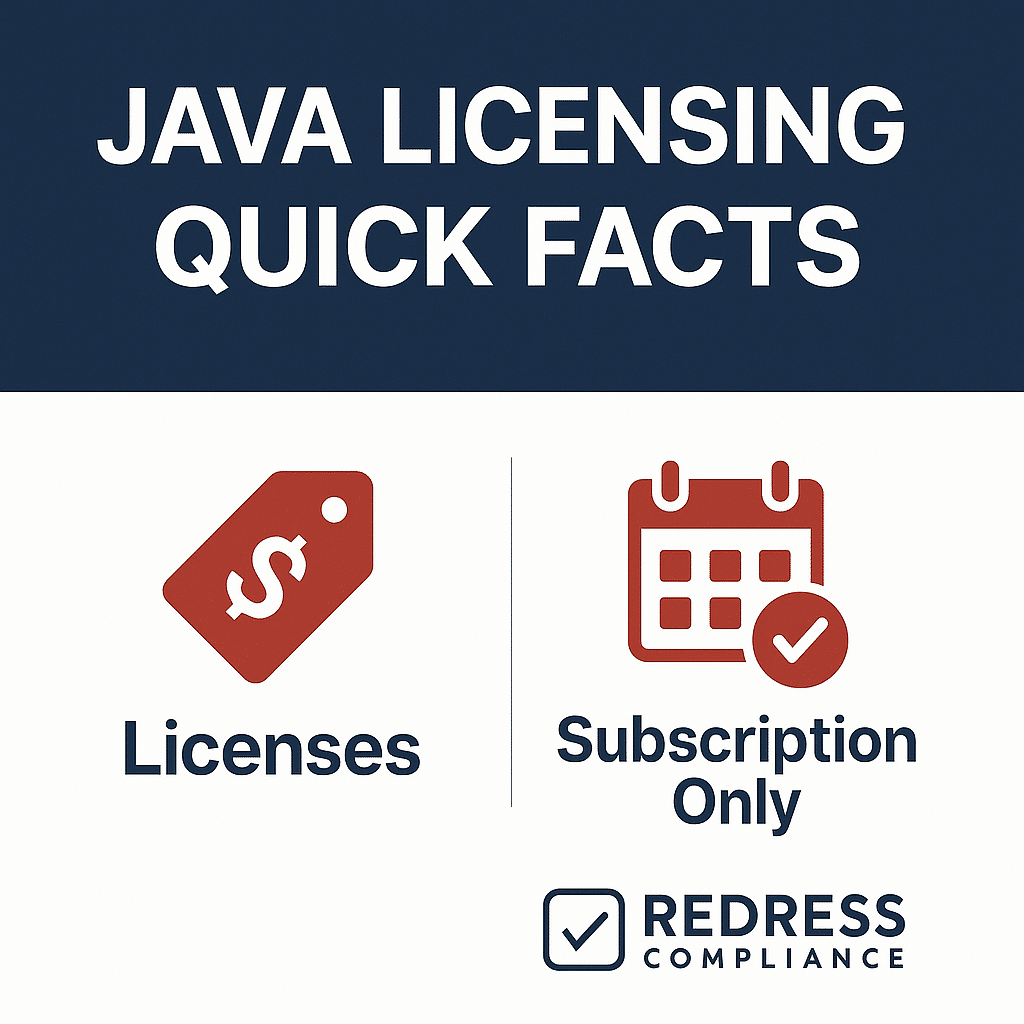
Java Licensing Quick Facts
Java licensing keeps changing — and that confusion keeps costing enterprises money. Here’s everything you need to know in one place, updated for 2026.
Pro Tip: “Licensing simplicity isn’t Oracle’s goal — predictability is yours.”
Read our overview guide, Oracle Java Licensing FAQs & Myth-Busting.
The 2026 Snapshot
- Oracle Java is no longer free for commercial use. A paid subscription is now required for business use.
- It’s licensed per employee, not per device. You’re billed by headcount, not hardware.
- Oracle JDK and OpenJDK share the same code base — but not the same cost. Oracle’s version costs money; OpenJDK is free.
- Oracle audits are on the rise, especially for mid-size enterprises. No company is too small to be audited.
- OpenJDK and vendor builds are viable, safe alternatives. They receive regular updates without Oracle’s price tag.
Key Licensing Milestones
Major licensing changes by year:
| Year | Licensing Model | What Changed |
|---|---|---|
| Pre-2019 | BCL (Binary Code License) | Java free for most uses. |
| 2019 | Java SE Subscription | Paid per user or processor. |
| 2021 | NFTC (No-Fee Terms & Conditions) | Free for personal/dev use only. |
| 2023 | Employee-Based Subscription | Paid per employee, covers all devices. |
| 2025 | Universal Enforcement | Oracle audits expanding globally. |
Pro Tip: “Every new model costs more to do the same thing.”
Who Needs a License
✅ Any organization running Oracle JDK in production. Production use always requires a paid license.
✅ Companies with staff, contractors, or subsidiaries using Oracle JDK. All these count as “employees” under Oracle’s definition.
✅ Users of Oracle JDK outside Oracle Cloud Infrastructure. Outside OCI, you need your own Java license.
✅ OEM or software vendors embedding Oracle JRE in their products. Embedding Oracle’s Java in a product requires a proper license agreement.
❌ You don’t need a license if you use OpenJDK or third-party builds (Azul, Corretto, Red Hat). These are free, open-source distributions with no Oracle fees.
What’s Still Free in 2026
Luckily, some scenarios remain free even in 2026:
- Personal or educational use. Home and school Java usage remains free.
- Internal testing and evaluation. Non-production testing doesn’t incur fees.
- Workloads on Oracle Cloud Infrastructure. OCI includes Java at no extra cost.
- OpenJDK and most third-party distributions. These community JDKs remain free to use.
Pro Tip: “If you didn’t download it from Oracle, you’re probably safe.”
What is a license, and what is support? – Oracle Java Support vs License – FAQ.
Audit and Compliance Reality
Oracle’s enforcement is real. Here’s the reality:
- Oracle can audit based on download or usage data. They often know if you’ve downloaded Oracle’s Java.
- “Soft audits” often begin as friendly check-ins. An Oracle rep might casually reach out to “help” assess your Java usage.
- Employee count mismatches trigger true-ups. Oracle will bill you if your license count doesn’t cover everyone.
- Documentation is your best defense. Keep thorough records of Java usage and any license entitlements.
Pro Tip: “Audits don’t start with letters — they start with data Oracle already has.”
Checklist – Java Licensing at a Glance
Run through this checklist to stay on top of Java licensing:
- ✅ Identify which JDK builds are in use. Take inventory of all Oracle JDK installations in your environment.
- ✅ Replace Oracle JDK with OpenJDK wherever possible. It’s usually a seamless swap.
- ✅ Track employee counts. They directly drive cost. Keep your headcount updated to avoid surprises.
- ✅ Document any bundled Java rights (WebLogic, EBS, etc.). Some Oracle products include Java rights – know what you already have.
- ✅ Review your renewal terms 6–12 months in advance. That lead time lets you consider alternatives or negotiate better terms.
Fast Facts Table
Here’s a quick reference on the current model and its implications:
| Topic | Key Insight |
|---|---|
| Model | Per-employee subscription |
| Minimum Cost | Applies to all staff, even non-developers |
| Audit Risk | High if Oracle JDK detected in production |
| Alternatives | OpenJDK, Corretto, Red Hat, Azul |
| Free Use | Only for personal or testing |
| Migration Path | Easy — OpenJDK is a drop-in replacement |
Final Take
Java isn’t complicated.
Oracle’s licensing is.
Stay compliant, cut costs, and question every “free” claim.
Pro Tip: “The cheapest Java license is the one you never have to buy.”
Read about our Java Advisory Services.